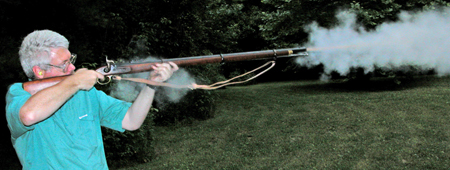New Bonekemper on McClellan
26 March 2007
McClellan and Failure: A Study of Civil War Fear, Incompetence and Worse, Edward Bonekemper’s new book, is introduced in part by the publisher on Amazon, thus:
Promoting his own ideas and career regardless of the consequences, McClellan spent his Civil War command defying his superiors and attempting to avoid battle, eventually becoming a thorn in the side of President Lincoln and the Union cause. Removed from command on November 5, 1862, McClellan’s overly cautious attitude nevertheless permeated the Army of the Potomac for years…
I hope this’ll give us fresh research, new insights, and the definitive answers, but it sure sounds like the same tired dogma. We’ll have to read the book to see.
Thanks to Mike for the pointer.
A ‘special interpretive event’ on Civil War Journalism will be held at the Battlefield Park on Saturday 21 April with a series of exhibits and speaker.
The press release:
The Washington County Free Library has partnered with Antietam National Battlefield [ANB], the Washington County Convention and Visitors Bureau and other area organizations to produce a special interpretive event on April 21, 2007 at the Antietam National Battlefield Visitor Center. This event will celebrate the completion of the Hagerstown Civil War Newspaper Index. These newspapers were thought to be long lost, but over the past several years have been located in several institutional collections. The Historic Newspaper Indexing Project is funded through grants from the Washington County Historical and Fine Arts Trust.
The on-line index provides a searchable database of subjects and names with corresponding references to newspaper issues on microfilm at the Washington County Free Library in Hagerstown, MD. The interpretive event and special exhibits will be held at the Antietam National Battlefield Visitor Center [map] from 8:00 AM to 6:00 PM. Exhibits will be provided by Washington County Rural Heritage Museum, the National Museum of Civil War Medicine, the Catoctin Center for Regional Studies, the Fashion Archives at Shippensburg University and the Washington County Free Library.
On Saturday April 21 at 2:00 PM, Mr. Brayton Harris will speak in the Visitor Center Theater on the subject of Civil War Journalism with special emphasis on the Battle of Antietam. Mr. Harris is a retired U.S. Navy Officer and author of eight books and numerous articles on naval and publishing related subjects. For additional information contact Carol Appenzellar, Washington County Free Library at 301-739-3250, ext. 151.
Light under a bushel: another ACW blog
20 March 2007
I stumbled upon another Civil War focused blog today in Hardtack and Hard Times by Kingsport (TN) Times-News photographer Ned Jilton II. He writes about his hobby of history with emphasis on the War, and features local places and events.

Photographer & blogger Ned Jilton firing repro 1853 Enfield (photo from Hardtack and Hard Times)
Ned’s been publishing since at least last August, so I have some catching up to do.
I hope you’ll all make him feel t’home.
